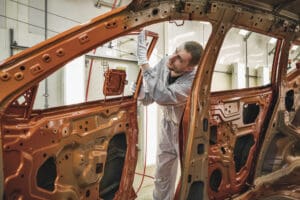
UK economic growth slowed sharply in the third quarter, rising just 0.1% between July and September, as a steep fall in car production and subdued consumer spending weighed on activity ahead of the Chancellor’s Budget later this month.
The figure, published by the Office for National Statistics, came in below analysts’ expectations of 0.2% and marks a clear slowdown from the 0.3% growth recorded between April and June and the 0.7% expansion at the start of the year.
The ONS said the downturn was driven by a “marked” fall in car production, after a cyber-attack on Jaguar Land Rover forced the UK’s biggest carmaker to halt manufacturing for five weeks. The attack, which began on 31 August, led to a 28.6% collapse in car output in September and pushed overall production output down 2%.
Even excluding the disruption in the automotive sector, the wider economy showed signs of fragility. Growth in services and construction slowed compared with the previous quarter, with consumer spending remaining weak as households continue to grapple with high living costs and uncertainty ahead of the 26 November Budget.
Economists warned the softer-than-expected figures underline the challenges facing Chancellor Rachel Reeves, who has repeatedly put economic growth at the centre of her agenda but is widely expected to announce tax rises to plug a fiscal shortfall.
Some analysts now believe the weak GDP data increases the likelihood of an interest rate cut from the Bank of England as early as December. Rob Wood, chief UK economist at Pantheon Macroeconomics, said the numbers “all but seal a December rate cut”, especially when combined with the disappointing labour market figures published earlier this week.
For many businesses, the slowdown reflects the lingering impact of last year’s Budget, which raised employer National Insurance contributions and increased the national living wage.
Allan Jones, managing director of TC Morris, a pie manufacturer in Dudley employing around 50 people, said his operating costs had risen by £200,000 this year.
“I think there’s a level at which people are prepared to pay for a pork pie,” he said. “We’ve managed to pass on some increases, but we’ve had to absorb quite a bit. We need to see some easing in the Budget – lower taxes, lower energy costs, and more support for investment.”
Responding to the data, Reeves said the UK still had the fastest-growing economy in the G7 in the first half of the year, but acknowledged “there’s more to do to build an economy that works for working people”. She said her upcoming Budget would take “fair decisions” to cut waiting lists, reduce the national debt and lower living costs.
Shadow chancellor Mel Stride accused the government of losing authority, arguing that Sir Keir Starmer had “stripped the chancellor of responsibility for the Budget”.
Liz McKeown, ONS director of economic statistics, highlighted a “particularly marked fall” in car output due to the cyber incident and a decline in the volatile pharmaceuticals sector.
“Services were the main contributor to growth,” she said, “with business rental and leasing, live events and retail performing well, partly offset by falls in R&D and hair and beauty salons.”
Ruth Gregory, deputy chief UK economist at Capital Economics, said the outlook remained sluggish even without the disruption from JLR. “The economy is struggling to gain decent momentum,” she said. “With tax rises in the upcoming Budget likely to trim GDP by around 0.2% in 2026, there is little reason to think growth will accelerate much from here.”
Read more:
UK growth slows to 0.1% as car production slump drags economy ahead of budget

